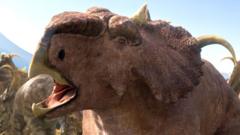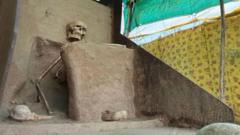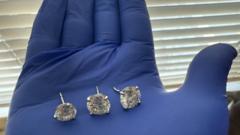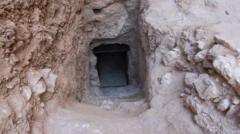The excavation of a lavish bathhouse in Pompeii, Italy, has unveiled remarkable insights into the lives of the wealthy elite while also highlighting the tragic fates of its inhabitants during the catastrophic eruption of Mount Vesuvius.
Unearthing Luxury and Tragedy: A Stunning Discovery at Pompeii
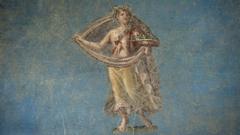
Unearthing Luxury and Tragedy: A Stunning Discovery at Pompeii
Archaeologists uncover one of the largest private bathhouses in Pompeii, revealing insights into the opulence and despair of ancient Roman life.
The recent unearthing of a magnificent private bathhouse in Pompeii, preserved for nearly 2,000 years under layers of volcanic rock and ash, has captivated archaeologists and historians alike. This "once-in-a-century" discovery is believed to be the largest bath complex found in this ancient Roman city, offering a glimpse into the luxurious lifestyle of its wealthy residents, as well as the tragedies that struck during the infamous eruption of Mount Vesuvius in AD 79.
Dr. Gabriel Zuchtriegel, director of the Archaeological Park of Pompeii, shared exclusive insights about the newly uncovered bathhouse, which features hot, warm, and cold rooms, beautifully crafted artwork, and a large plunge pool, capable of accommodating 20 to 30 bathers. The extraordinary findings were revealed as part of an extensive excavation campaign, one of the most ambitious in decades.
In addition to the bathhouse, archaeologists also painstakingly analyzed two skeletons discovered within the premise. These poignant remains belong to a woman between 35-50 years and a younger man in his teens or early twenties. They had sought refuge in a small room during the eruption, tragically caught in the catastrophic rush of volcanic gases and materials. Dr. Ludovica Alesse, a Pompeii conservator, emphasized that every discovery highlights the dramatic narrative of this ancient city.
Amidst luxurious surroundings, the stark contrast with the lives of the enslaved individuals responsible for maintaining the bathhouse becomes evident. Features such as a lead boiler indicated the grueling labor required to sustain such lavish living spaces. Furthermore, the discoveries reveal not only the extravagant lifestyle of the residents, presumably of elite status such as the politician Aulus Rustius Verus, but also serve as a poignant reminder of the social hierarchies of Roman society.
Additional areas surrounding the bathhouse, such as a bakery and a laundry, have also been excavated, shedding light on the broader community dynamics of Pompeii as the team continues their work against the backdrop of this remarkable historical narrative.
This extensive excavation is captured in an upcoming BBC documentary series "Pompeii: The New Dig," showcasing the intricate details of this remarkable archaeological journey. As excavations reach their final stages, archaeologists remain hopeful for further unexpected discoveries, enhancing our understanding of this iconic ancient civilization.
Dr. Gabriel Zuchtriegel, director of the Archaeological Park of Pompeii, shared exclusive insights about the newly uncovered bathhouse, which features hot, warm, and cold rooms, beautifully crafted artwork, and a large plunge pool, capable of accommodating 20 to 30 bathers. The extraordinary findings were revealed as part of an extensive excavation campaign, one of the most ambitious in decades.
In addition to the bathhouse, archaeologists also painstakingly analyzed two skeletons discovered within the premise. These poignant remains belong to a woman between 35-50 years and a younger man in his teens or early twenties. They had sought refuge in a small room during the eruption, tragically caught in the catastrophic rush of volcanic gases and materials. Dr. Ludovica Alesse, a Pompeii conservator, emphasized that every discovery highlights the dramatic narrative of this ancient city.
Amidst luxurious surroundings, the stark contrast with the lives of the enslaved individuals responsible for maintaining the bathhouse becomes evident. Features such as a lead boiler indicated the grueling labor required to sustain such lavish living spaces. Furthermore, the discoveries reveal not only the extravagant lifestyle of the residents, presumably of elite status such as the politician Aulus Rustius Verus, but also serve as a poignant reminder of the social hierarchies of Roman society.
Additional areas surrounding the bathhouse, such as a bakery and a laundry, have also been excavated, shedding light on the broader community dynamics of Pompeii as the team continues their work against the backdrop of this remarkable historical narrative.
This extensive excavation is captured in an upcoming BBC documentary series "Pompeii: The New Dig," showcasing the intricate details of this remarkable archaeological journey. As excavations reach their final stages, archaeologists remain hopeful for further unexpected discoveries, enhancing our understanding of this iconic ancient civilization.



